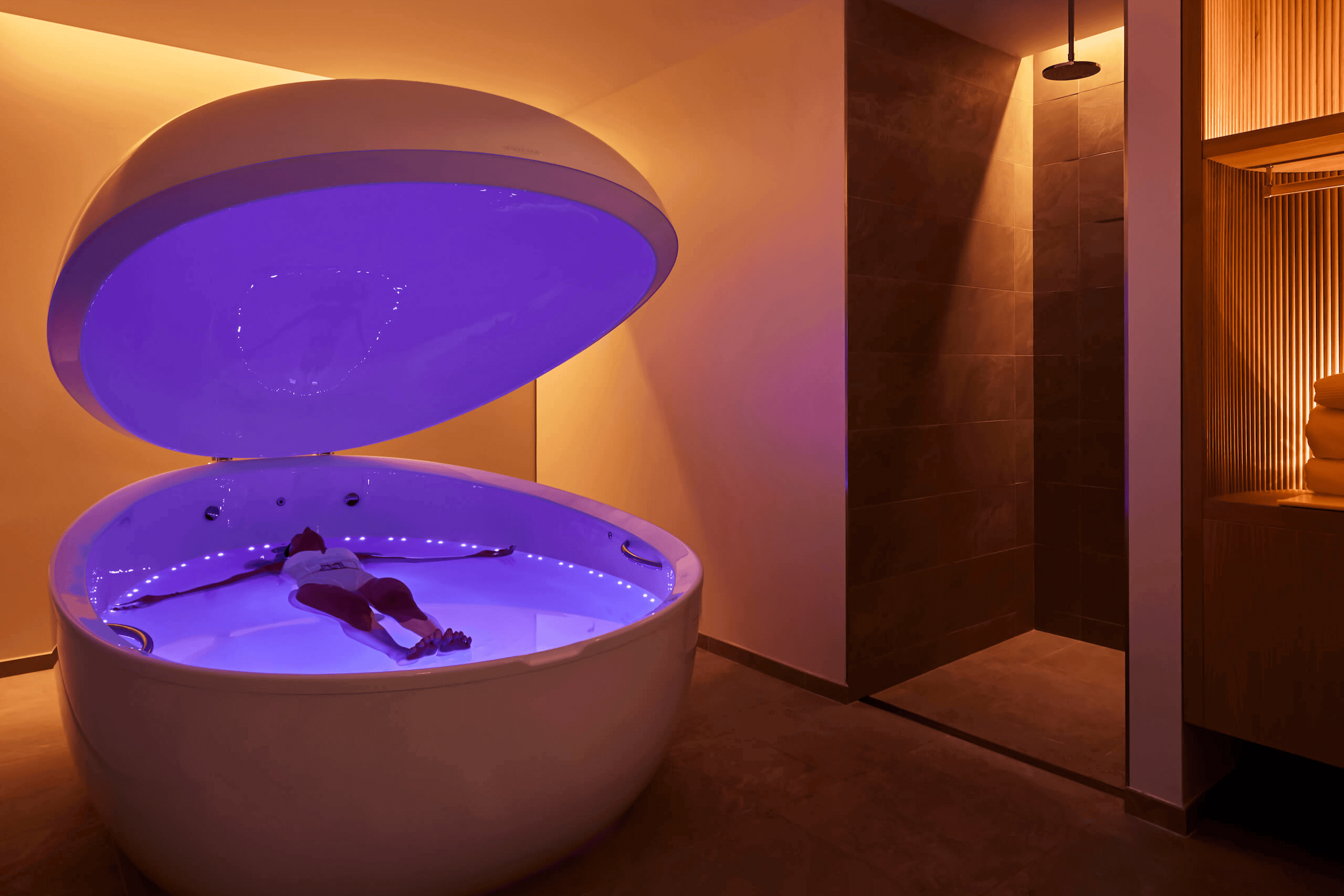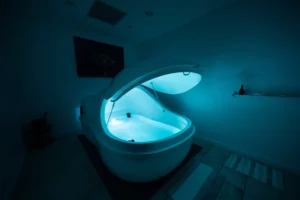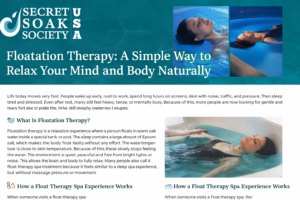Getting good sleep is one of the most important parts of staying healthy and productive. For many people in the United States, especially business owners, professionals, and local entrepreneurs, sleep often gets disrupted because of stress, late work nights, and constant use of technology.
A growing number of people are turning to float therapy as a natural way to improve sleep. The effects of float therapy go far beyond simple relaxation and can make a real difference in how quickly you fall asleep and how rested you feel the next day.
What is Float Therapy?
Float therapy is also called sensory deprivation therapy. During a session, you lie in a special tank filled with warm water mixed with a large amount of Epsom salt. The water supports your body so you feel completely weightless. The tank is quiet and dark, which helps your brain and body let go of stress.
When you step into a float tank, outside distractions fade away. Your body relaxes, your mind slows down, and you enter a calm state that is very similar to meditation. This is why the effects of float therapy are closely linked to better sleep.
Why Sleep Problems Are So Common
Sleep issues are widespread in the United States. According to the CDC, nearly one in three adults does not get enough sleep regularly. Lack of rest lowers energy, reduces focus, and increases health risks. For business owners and professionals, poor sleep often leads to lower productivity and higher stress.
This is where the effects of float therapy become valuable. Float therapy gives the mind and body a chance to reset in a way that supports healthier sleep.
How Float Therapy Helps You Sleep Better
Here are the main reasons why the effects of float therapy are strongly connected to improved sleep:
Float Therapy Lowers Stress
Stress is one of the top reasons people cannot sleep well. A float therapy session lowers stress hormones like cortisol and helps the nervous system calm down. When your body is in this relaxed state, falling asleep becomes easier.
Float Therapy Provides Magnesium Support
The salt used in the float tank is full of magnesium, a mineral that plays a key role in sleep. Magnesium relaxes muscles, calms the nervous system, and supports the production of melatonin, which controls sleep cycles. Floating may allow your body to absorb magnesium naturally through the skin.
Float Therapy Trains the Brain for Rest
Inside the float tank, your brain shifts into slower brainwaves that are similar to what happens when you are just about to fall asleep. Spending time in this state during a float therapy session helps your mind get ready for deeper sleep later at night.
Float Therapy Relieves Muscle and Joint Tension
Many people toss and turn because of muscle tightness or joint pain. The weightless feeling of floating releases pressure on the body, making it easier to relax fully. This comfort often leads to faster and deeper sleep.
Float Therapy Supports a Natural Sleep Cycle
Modern habits like working late on computers or using phones at night disturb the body’s natural clock. The effects of float therapy help reset that rhythm. People often notice they fall asleep at a healthier time and wake up more refreshed.
The Science Behind Float Therapy and Sleep
Research supports what many people already know from experience. Studies show that floating reduces anxiety, lowers blood pressure, and improves overall relaxation. Each of these benefits is closely tied to sleep quality.
For busy professionals, this means float therapy does not just feel good—it provides measurable improvements that can directly affect rest and recovery.
Float Therapy for Professionals and Business Owners
Running a business in the United States often means late nights, financial pressures, and a constant flow of communication. Over time, this lifestyle makes restful sleep harder to achieve.
The effects of float therapy help business owners and professionals recharge. Better sleep leads to clearer thinking, stronger focus, and more balanced energy throughout the day.
Comparing Float Therapy with Other Sleep Aids
People often try many different ways to sleep better. Some use sleeping pills, while others try herbal teas, meditation apps, or breathing exercises. Pills may work quickly but can create dependency or grogginess. Teas and apps may help but often provide only mild results.
The effects of float therapy stand out because they are natural, non-invasive, and impact both the body and the mind at the same time.
Tips for Using Float Therapy to Improve Sleep
To make the most out of the experience:
- Try scheduling your float therapy session in the evening so your body is ready to rest afterward.
- Avoid heavy caffeine use on the day you float.
- Keep a consistent bedtime routine to support the results.
- Use float therapy regularly, not just once, for long-lasting improvements.
Conclusion
Sleep problems affect health, focus, and productivity. The effects of float therapy give people a safe and natural way to reset the mind and body. From reducing stress to easing muscle pain, float therapy targets many of the root causes of poor sleep at once.
For professionals, entrepreneurs, and local businesses in the United States, better sleep means better performance, clearer decisions, and stronger energy.
At Secret Soak Society, our team creates the right setting for deep relaxation and recovery. If you are ready to experience the difference a float therapy session can make, connect with us today and take the first step toward better sleep.
FAQs About Float Therapy and Sleep
How many sessions are needed for better sleep?
Most people notice improvement after a few sessions. Weekly or bi-weekly floats can help maintain results.
Can float therapy replace sleep medication?
Float therapy offers natural support for sleep, but you should always talk with your doctor before changing any prescribed treatments.
Is float therapy safe?
Yes, float therapy is safe for most people. If you have health concerns, check with your healthcare provider first.
What if I feel uncomfortable in the tank?
You can leave the lid open or keep a soft light on if that makes you feel better. Many people get used to the space after their first session.
How quickly will I feel the benefits?
Some people sleep better after the first float, while others need several sessions for noticeable results.






